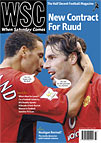 Al Needham couldn’t quite believe just how poor John Barnes is working in television – and was even more shocked when he started thinking about all the competition and realised that Emlyn Hughes was quite good
Al Needham couldn’t quite believe just how poor John Barnes is working in television – and was even more shocked when he started thinking about all the competition and realised that Emlyn Hughes was quite good
He dealt with intense media scrutiny ever since the start of his playing career. He went on to become one of the most important players in the country. He played a major part in England’s 1990 World Cup campaign. He’s dabbled in TV adverts. As soon as he retired, he was snapped up as a pundit and before too long became a presenter on a terrestrial channel. So why is John Barnes so toe-curlingly bad at his new job?
Every time he appears on Five, hands all over the country automatically drop the remote and slide down faces. This is the bloke in the New Order video? Who managed to kick the Lucozade bottle into the bin first time? The only man who walked away from The Anfield Rap with a shred of credibility?
Later, you start to rack your brain for players who actually are competent on TV. And beyond the hardcore dozen or so who pop up every week on The Premiership or who have spent more time at the BBC than they did at their last club, the pickings are shockingly lean. David Beckham is supposed to be the most media-savvy player ever, but this theory only holds up during the periods when someone isn’t thrusting a mic in his face. Ian Wright will be, as soon as the BBC find a format he’s comfortable in. John Fashanu managed it on Gladiators, but only because he was dealing with people called Wolf and Scorpion, paid to be even more superficial than he was.
And then you’re casting your mind back into TV history and forgiving Emlyn Hughes and Jimmy Hill, for at least they knew which camera to look at, regardless of what they had to say and how badly they got on your nerves. Seeing as football and television have been in bed with each other longer than the grandparents in Charlie and the Chocolate Factory, why can’t players make the leap from one box to the other without falling on their faces?
Firstly, let’s talk about the better examples. Kenny Dalglish in Scully, as the protagonist’s idol who appears in visions. Eric Cantona in the Nike adverts. Thierry Henry shilling the virtues of Renault. Vinnie Jones, depicting a scowling thug, advertising a girls’ drink. Are we detecting a pattern here? They’re all playing themselves, in a dramatic format that allows retakes and being onscreen as little as possible.
The worst examples? Pretty much everything outside of the friendly confines of sports programming. When Peter Marinello was signed by Arsenal at the tail end of the Sixties, his reputation as the new George Best was shattered within days when he appeared on Top of the Pops. Giving away the top five singles to the winner of a dancing competition, he had all the verve of a gawky teenager forced to oversee his little sister’s birthday party. Best himself, in every television appearance he’s made that wasn’t alcohol-assisted. Even Gazza, the one person who you would have put money on having a TV career after he retired (probably a game show adopted from Japan, or a remake of Tiswas) has failed to display a fraction of his on-field spontaneity.
Actually, when you think about it, the reasons are obvious; a successful football career, far from being an education in TV, is a barrier. Sure, players get interviewed all the time, but what do they say? Nothing; it’s not worth the hassle. Everyone moans about the lack of articulate players, but if you were interviewed about your job on TV, would you talk about who gets on your wick, how crap your boss is and what company is trying to headhunt you, knowing that it will be in the papers the next day? Football is a team sport. Media isn’t. This is why the most memorable pundits are managers, who until recently were answerable to no one as long as they kept the results coming and pretty much had free rein to spout off as much as they liked.
And in any case, we like our players to stay thick and ordinary, and any attempt to prove otherwise is met with suspicion – when the 1998 England World Cup squad livened up interviews by dropping in as many song titles as possible, they were pilloried in certain quarters for not realising the gravity of the situation. Neil Ruddock in I’m A Celebrity… is the desired stereotype of the ex-footballer to a tee; a matey, gregarious yet unconfrontational herd-follower. Who looks like a pub landlord.
Maybe we shouldn’t be wondering why footballers come off so badly on TV. In an age when the game’s presentation of football on TV has altered beyond all recognition, it’s reassuring that Sky can’t do anything to change the actual players. And anyway, have you seen the blocks of wood masquerading as the England rugby team?
From WSC 205 March 2004. What was happening this month